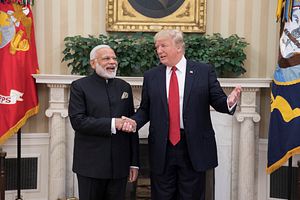While attention ahead of Pakistani Prime Minister Imran Khan’s visit to Washington focused on a list of expected discussion points and deliverables, ultimately the trip was dominated by the fallout from an unexpected controversy that emerged during his meeting with U.S. President Donald Trump. While responding to Khan’s request for U.S. assistance to resolve the issue of Kashmir, Trump said that India’s Prime Minister Narendra Modi had also asked Trump to mediate the Kashmir dispute.
The Pakistani government was understandably gleeful. In India, meanwhile, there was consternation, with opposition parties raising the issue in the Parliament and demanding that Modi clarify whether he had indeed asked Trump to mediate. Nonetheless, overall, India has thus far managed the issue quite well and prevented another challenge from being added to the list New Delhi and Washington both face.
India’s long-standing position has been that Kashmir is a bilateral issue that needs to be negotiated directly between India and Pakistan. India had always refused overt third-party involvement in the Kashmir dispute especially in terms of any mediation between India and Pakistan. India’s External Affairs Minister Dr. S. Jaishankar reiterated that position and stated that India had not indeed asked for any mediation. India’s Ministry of External Affairs (MEA) also put out a statement rebutting Trump’s assertion that Modi had asked him to mediate.
This unexpected kerfuffle briefly threatened to put a dent in U.S.-India relations, which is already facing a number of other difficulties. For instance, India’s decision to buy the S-400 air defense missile from Russia puts India afoul of the U.S. Countering America’s Adversaries Through Sanctions Act (CAATSA), even though India felt that the capabilities that it was acquiring with the missile were too important for it to give in to the U.S. objections about buying the missile.
Similarly, the worsening tensions between the United States and Iran and Washington’s demands that India comply with the U.S. sanctions on Tehran have not gone down well in New Delhi because India sees Iran as strategically important to flank Pakistan. Finally, the U.S. efforts to find a way out of Afghanistan led Washington to once again seek Pakistan’s help, much to India’s discomfort. India has been left out of the discussions on the future of Afghanistan and it feels abandoned by the United States. In addition, Trump’s withdrawal of the Generalized System of Preferences (GSP) on India and the tariff war between the two countries are not helping either.
Indian unhappiness with Washington is only one part of the problem. In Washington itself, there is are still doubts about the balance of obligations and whether the American strategic bet on India is worthwhile. Though these are as yet murmurs, the fact that even some of the strongest supporters of closer U.S.-India relations are now expressing doubt about India’s commitment should be worrisome to New Delhi.
Coming on top of these growing mutual doubts, Trump’s gaffe could potentially have proved to be quite damaging. But New Delhi has reacted with surprising maturity. That suggests that this will not lead to any lasting negative fallout.
Though the Indian foreign minister was firm in rejecting Trump’s assertion that he was asked to mediate, the response was also quite measured. While India’s opposition parties raised a ruckus in the Parliament on the issue, the Indian government did not panic.
The government could have taken a much stronger stance in the Parliament in order to pacify the domestic opinion in India, but it may have felt it did not need to given political dynamics. Despite the noise, the Indian opposition is in a considerably weak state. They are yet to recover from the drubbing they received in the recent general elections. The main opposition party, the Indian National Congress, is grappling with internal problems and is currently leader-less and direction-less. Despite a lot of pre-election chatter about regional parties coming together to form a national alternative to the BJP, nothing has come of it and many regional parties suffered serious setbacks in the elections. The comfortable domestic political situation might be one reason why the government felt little need to go overboard in criticizing the Trump statement.
Another factor is the general state of U.S.-India relations itself. With a number of issues already rocking the relationship, New Delhi probably did not want to fuel any further controversy in the relationship. Though India is trying to maintain some level of stable relationships with all the major powers, including Russia and China, there is probably a recognition that India also has to maintain its closeness to the United States.
Finally, there is also probably acceptance that Trump will be Trump and that India should discount some of Trump’s antics in the interest of the relationship. It helped that within hours of Trump’s statement, the U.S. State Department discounted Trump’s statement about India seeking mediation. Other U.S. leaders such as the Congressman Brad Sherman also publicly castigated Trump for the statement. The U.S. House Committee on Foreign Affairs too came out with a statement supporting the Indian point of view. Not only that, Representative Eliot L Engel, chairman of the House Committee on Foreign Affairs, “reaffirmed that in order for dialogue to be meaningful, Pakistan must first take concrete and irreversible steps to dismantle the terrorist infrastructure on Pakistan’s soil.”
Since all of these statements, coming from various sources beyond just the president himself, clarified that Trump’s statement was not U.S. policy, New Delhi probably felt confident that it need not worry that Trump’s statement had presaged any change in the U.S. policy on Kashmir.
U.S.-India relations do face some challenges. But the mature handling in New Delhi of this unexpected controversy during Khan’s visit to Washington has ensured that another item was not added to the list of grievances on both sides.

































